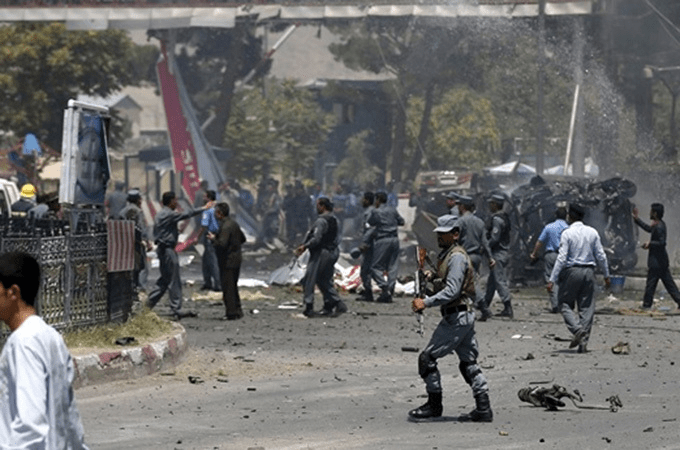In the wake of George Floyd’s violent death at the hands of police officers, demonstrations erupted across the United States demanding justice and an end to the impunity of police violence. The protest movement received support from around the world and as far as Kabul, where Afghan artists painted murals memorializing Floyd.
In mid-June, US President Donald Trump attempted to appease American protesters by signing an executive order which encouraged limiting the use of chokeholds and sought to create a national database for police misconduct. The executive order was described as “a band-aid for a bullet wound” and caused much public anger across the country.
But a few days earlier, another brazen attack on justice by the Trump administration garnered little attention from the American public. US Secretary of State Mike Pompeo announced sanctions against International Criminal Court (ICC) employees for investigating US war crimes in Afghanistan. The move was meant to shield war criminals and steals justice from Afghan civilians. It is important for the American society, especially civil rights marchers, to pay attention.
Impunity for the US military abroad is closely linked to impunity for police forces at home. Americans will not win the battle against police brutality unless they also take on the issue of US war crimes abroad. Expressing support for the ICC at this point is crucial.
Impunity for the US military
The ICC holds a mandate to examine cases which national authorities are unable or unwilling to investigate, such as large-scale war crimes, including genocide. While the US has not joined the ICC, 123 countries have, including most US allies and nearly every OECD member.
Since the “War on Terror” began in 2001, reports of numerous war crimes, including soldiers hunting civilians for sport and CIA operatives systematically abusing prisoners, have surfaced in Afghanistan and Iraq. While there have been some cases of prosecution – for example, for torture in Iraq’s Abu Ghraib prison, which yielded convictions of US military personnel – there have been insufficient efforts to properly investigate all reported crimes. Many accused have been acquitted, never charged, or have received minor punishment.
If the US had fairly prosecuted crimes its citizens allegedly committed in Afghanistan, the ICC would not have had to step in to try those individuals.
While previous administrations chose to ignore the problem, Donald Trump’s administration has decided to directly attack the ICC’s probe into US war crimes.
All this does not come as a surprise given that the US has embraced war criminals, pardoning three US service members accused or implicated in war crimes in Afghanistan and Iraq, while loosening the rules of engagement in Afghanistan. He has also ordered an unprecedented surge of air strikes, and reportedly given “unlimited authority, no-holds barred” to the secretary of defence, Jim Mattis, in Afghanistan.
This policy is likely the reason why, in the first half of 2019, civilian deaths from Afghan government and US operations exceeded the number caused by the Taliban for the first time. According to Human Rights Watch, between January 1 and September 30, 2019, some 8,000 civilians were killed in Afghanistan.
The ICC has collected at least 1.17 million statements from Afghans claiming to be victims of war crimes during its investigation of crimes committed by the Taliban, Afghan government forces and US military personnel since May 2003.
Given the devastation that the war has inflicted on Afghanistan and the heavy civilian death toll – more than 100,000 were killed between 2010 and 2019 alone – it is imperative for all war criminals including Americans to be tried. This would not only provide the families of victims with justice but also assist the peace-building process in Afghanistan as well.
The argument the Trump administration is making against the ICC is void. As the UN special rapporteur on torture, Nils Melzer, has pointed out, “The whole argument of the court being illegal, illegitimate and corrupt obviously is not a new argument … The same argument has been made by the Nazis in Nuremberg – and by Slobodan Milosevic in the Yugoslavia tribunal. It has been made by Saddam Hussein in the tribunal for Iraq.”
The civil rights struggle at home and abroad
Violent crimes perpetrated abroad by the US military are deeply linked to violence unleashed at home. Leaders of the civil rights movement of the 1960s and thereafter recognised this very point. Dr Martin Luther King Jr, for example, remarked that, “I could never again raise my voice against the violence of the oppressed in the ghettos without having first spoken clearly to the greatest purveyor of violence in the world today: my own government.”
Other prominent leaders of the movement, including Stokely Carmichael and Fannie Lou Hamer, also spoke out against war and US impunity overseas. Angela Davis identified the global ramifications of domestic oppression in 1969, asserting that, “We have been forced to see that the enemy is American imperialism and although we feel it here at home it’s being felt perhaps much more brutality in Vietnam, it’s being felt in Latin America, it’s being felt in Africa.”
Today, American imperialism is no less brutal and expansive. Since 2001, the so-called War on Terror has stretched far beyond Afghanistan, into the Middle East, Southeast Asia and Africa. Violence and surveillance used abroad have been deployed at home, just as military equipment produced for the wars in Afghanistan and Iraq has been handed over to the US police force.
Some prominent US civil rights leaders have made this critical connection between imperial violence abroad and at home. Scholar Cornel West has said that “In the tradition of Martin Luther King Jr, we have to be morally consistent in our critique of US racism, militarism, poverty, as well as materialism.”
The Movement for Black Lives has emphasised that “our liberation is intrinsically tied to the liberation of Black and Brown people around the world”, while the Poor People’s Campaign has called for “an end to military aggression and war-mongering”.
Yet, we must go beyond declarations of principle. Civil rights marchers in the US need to express support for the ICC and push for cancelling the sanctions against its employees. Divesting from and disbanding police forces must go hand in hand with downsizing US military expenditure and reallocating resources to global peacebuilding, transforming US foreign policy into a tool to advance social and gender justice, and long underutilised and critical institutions like the State Department and USAID.
The US must seek to strengthen the UN and the global governance model it stands for, and join the ICC.
The intercommunity solidarity we seek to establish today in the face of state violence should be reflected in US foreign policy. Ending impunity for police brutality at home and war crimes abroad must be closely intertwined processes. For, as King said more than five decades ago, “Injustice anywhere is a threat to justice everywhere.”













